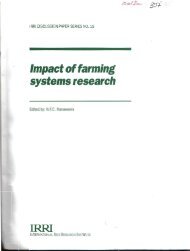- Page 1 and 2:
Impact of pesticide use on health i
- Page 3 and 4:
IMPACT OF PESTICIDE USE ON HEALTH I
- Page 5 and 6:
©International Development Researc
- Page 7 and 8:
Contents Acknowledgments viii Forew
- Page 9 and 10:
Control of disease vectors: a curre
- Page 11 and 12:
Foreword From their first appearanc
- Page 13 and 14:
PART! EPIDEMIOLOGY OF PESTICIDE POI
- Page 15 and 16:
Although pesticides are used both i
- Page 17 and 18:
Table 1. Introduction of pesticides
- Page 19 and 20:
problem. The International Developm
- Page 21 and 22:
impact of pesticides on Canadian wi
- Page 23 and 24:
investigated further. For example,
- Page 25 and 26:
Conclusions The subject of this vol
- Page 27 and 28:
Jusoh Mamat, M.; Anas, A.N.; Heong,
- Page 29 and 30:
Health-risk assessment of pesticide
- Page 31 and 32:
especially in the absence of comple
- Page 33 and 34:
depends largely on external factors
- Page 35 and 36:
Specific situations may require spe
- Page 37 and 38:
that the best possible work is done
- Page 39 and 40:
doses (chronic poisoning) or delaye
- Page 41 and 42:
Table 1. Poisoning incidents in fou
- Page 43 and 44:
Pesticide research for public healt
- Page 45 and 46:
Current pest control practices in T
- Page 47 and 48:
800- 400- 200 - 1980 1981 1982 1983
- Page 49 and 50:
designed 30-40 years ago (Jusoh Mam
- Page 51 and 52:
and tore easily. One investigation
- Page 53 and 54:
education, mass-communication tools
- Page 55 and 56:
Increase and improve training activ
- Page 57 and 58:
Castaneda, C.P. 1988. Pesticide poi
- Page 59 and 60:
Ooi, A.C.P.; Heong, K.L.; Lim, B.K.
- Page 61 and 62:
Investigations into acute pyrethroi
- Page 63 and 64:
Level of exposure To assess the lev
- Page 65 and 66:
Table 2. Cases of acute pyrethroid
- Page 67 and 68:
(in 121 subjects), usually develope
- Page 69 and 70:
Deltamethrin was detectable in the
- Page 71 and 72:
pyrethroid poisoning. Therefore, th
- Page 73 and 74:
Gilliatt, R.W.; Willison, R.G. 1963
- Page 75 and 76:
Table 1. Value of imported pesticid
- Page 77 and 78:
Study two Twelve farmers participat
- Page 79 and 80:
All activities Left hand (73.2) Lef
- Page 81 and 82:
Acknowledgment- The three studies r
- Page 83 and 84:
Since the creation of Pakistan in 1
- Page 85 and 86:
Table 1. Incidents of pesticide poi
- Page 87 and 88:
Sandu, S.S.; Waters, M.D.; Simmon,
- Page 89 and 90:
and chlordane. Pest resistance to t
- Page 91 and 92:
young workers was 15.8%, 6.8%, and
- Page 93 and 94:
Storage of pesticides Although the
- Page 95 and 96:
Discussion The lowland regions and
- Page 97 and 98:
Pulmonary obstructive disease in a
- Page 99 and 100:
To investigate the presence and mea
- Page 101 and 102:
Age (years) Table 1. Distribution o
- Page 103 and 104:
was among paraquat users who smoked
- Page 105 and 106:
Levin, P.J.; Klaff, L.J.; Rose, A.G
- Page 107 and 108:
the delta. The total population of
- Page 109 and 110:
The successive and simultaneous rel
- Page 111 and 112:
on clinical studies and laboratory
- Page 113 and 114:
This made the collection of blood s
- Page 115 and 116:
Table 1. Relation between informati
- Page 117 and 118:
analysis, and engaging in various t
- Page 119 and 120:
Table 1. Value (million KSH) of pes
- Page 121 and 122:
To develop a health-education packa
- Page 123 and 124:
Storage site Table 3. Storage of ag
- Page 125 and 126:
Table 5. Causes of agrochemical and
- Page 127 and 128:
Methods A pilot field survey was un
- Page 129 and 130:
Conclusion The practices followed b
- Page 131 and 132:
manufactured or formulated locally,
- Page 133 and 134:
However, based on individual compla
- Page 135 and 136:
Table 4. Acetylcholinesterase activ
- Page 137 and 138:
Age did not appear to be an importa
- Page 139 and 140:
eactions to the pesticides in occup
- Page 141 and 142:
Bowers, M,B.; Goodman, E.; Sim, V.M
- Page 143 and 144:
Extent of exposure of farm workers
- Page 145 and 146:
Group III consisted of 31 farmers w
- Page 147 and 148:
25 - 0 Level of exposure J Group 1,
- Page 149 and 150:
Pesticides were stored everywhere c
- Page 151 and 152:
Table 2. Concluded. Question Answer
- Page 153 and 154:
PART II RELATING PESTICIDE DEVELOPM
- Page 155 and 156:
Toxicity Table 1. Requirements and
- Page 157 and 158:
Screening Process development Route
- Page 159 and 160:
Progress in improving safety Pestic
- Page 161 and 162:
type of formulation, and warning pr
- Page 163 and 164:
The pyrethroid, cypermethrin, is mo
- Page 165 and 166:
Studying the effects of pesticides
- Page 167 and 168:
of the risk is a quantitative issue
- Page 169 and 170:
egistry could be linked to the lice
- Page 171 and 172:
poisoned through mishandling of an
- Page 173 and 174:
no documented incident could be fou
- Page 175 and 176:
Region Table 3. Use of using pictog
- Page 177 and 178:
of fluorinated HDPE because fluorin
- Page 179 and 180: Current initiatives, at the interna
- Page 181 and 182: inding within their jurisdictions.
- Page 183 and 184: Benefits of a hazard auditor From t
- Page 185 and 186: different agencies take to be permi
- Page 187 and 188: industry and of its serving to legi
- Page 189 and 190: Anonymous. 1988a. FAO code of condu
- Page 191 and 192: (Adam 1976; Fraser and Burrill 1979
- Page 193 and 194: in the lower price categories tend
- Page 195 and 196: Anas, N.; Jusoh Mamat, Md.; Heong,
- Page 197 and 198: Zam, A.K. 1980. Bancian pengurusan
- Page 199 and 200: Materials and methods Assessment of
- Page 201 and 202: At the end of each day's operations
- Page 203 and 204: Table 3. Number of garments chafing
- Page 205 and 206: underlines the need to change attit
- Page 207 and 208: Evaluation and management of pestic
- Page 209 and 210: target and react with some crucial
- Page 211 and 212: scientists on a contractual basis,
- Page 213 and 214: pesticides in developing countries
- Page 215 and 216: Regional information resources for
- Page 217 and 218: Table 2. Number of enquiries receiv
- Page 219 and 220: extent of this problem in developin
- Page 221 and 222: Promoting the safe use of pesticide
- Page 223 and 224: pests) is observed. Thus, the "quic
- Page 225 and 226: is one of principal agencies respon
- Page 227 and 228: Pretesting materials in training an
- Page 229: of costly medical technologies and
- Page 233 and 234: At the community level, the extent
- Page 235 and 236: Neufeld, V. 1989. Community-based m
- Page 237 and 238: Outline for learning module using o
- Page 239 and 240: WHO (World Health Organization). 19
- Page 241 and 242: In the past decade, tremendous effo
- Page 243 and 244: Jiang-Su province Results and discu
- Page 245 and 246: As a result of deregulation, the nu
- Page 247 and 248: Table 3. Proportion of workers usin
- Page 249 and 250: Shih, J.H.; Wu, Z.Q.; Zhang, Y.X.;
- Page 251 and 252: Pesticides and wildlife: a short gu
- Page 253 and 254: Using target-specific products mini
- Page 255 and 256: specifications. Other data are asse
- Page 257 and 258: Formulation-specific concerns The e
- Page 259 and 260: mirex, and chiordecone have been ba
- Page 261 and 262: 1984). The base for pesticide granu
- Page 263 and 264: e more stringently reviewed. In Can
- Page 265 and 266: For example, searching for carcasse
- Page 267 and 268: overlooked. In developing countries
- Page 269 and 270: Establish monitoring programs to de
- Page 271 and 272: Grue, C.E.; Fleming, W.J.; Busby, D
- Page 273 and 274: Schafer, E.W., Jr; Brunton, R.B. 19
- Page 275 and 276: Table 1. Prevalence and distributio
- Page 277 and 278: By 1980, resistance to at least one
- Page 279 and 280: tries. Japanese encephalitis has be
- Page 281 and 282:
to the targeted larvae of mosquitoe
- Page 283 and 284:
The role of the community Many prob
- Page 285 and 286:
from locally available sacking mate
- Page 287 and 288:
services. The project also includes
- Page 289 and 290:
Maxwell, C.A.; Curtis, C.F.; Haji,
- Page 291 and 292:
Botanical pesticides: optimizing pe
- Page 293 and 294:
neurotoxin but a cytotoxin, cross-r
- Page 295 and 296:
MoDuscicide- and pesticide-developm
- Page 297 and 298:
A development plan has been identif
- Page 299 and 300:
and environmental effects must be d
- Page 301 and 302:
Devitt, B.D.; Philogène, B.J.R.; H
- Page 303 and 304:
Endod, a potential natural pesticid
- Page 305 and 306:
University in Ottawa, and in other
- Page 307 and 308:
in the field (Lugt 1981), 137 500 m
- Page 309 and 310:
Hutchinson, J.; Dalziel, J.M. 1929.
- Page 311 and 312:
Community participation, including
- Page 313 and 314:
Acknowledgment- This research has b
- Page 315 and 316:
multiplication. The high temperatur
- Page 317 and 318:
Because pesticides are required in
- Page 319 and 320:
Africa and now East Africa. The suc
- Page 321 and 322:
Integrated pest management 1PM may
- Page 323 and 324:
to risk crop damage. Close involvem
- Page 325 and 326:
Ramos-Ocampo, V.E.; Magallona, E.D.
- Page 327 and 328:
esidues on fresh and cooked vegetab
- Page 329 and 330:
Grassy strip 108 N Farmer's Experim
- Page 331 and 332:
Table 1. Description and efficiency
- Page 333 and 334:
Table 3. Cost (PHP) of pest managem
- Page 335 and 336:
in the field. These pests were the
- Page 337 and 338:
PART V APPENDICES
- Page 339 and 340:
Ravindra Fernando, National Poisons
- Page 341 and 342:
Frank White, Pan-American Health Or
- Page 343 and 344:
ECHO abdominal ultrasonograph EEG e
- Page 345 and 346:
URT upper respiratory tract USAID U

















